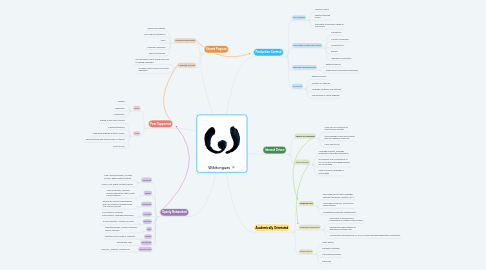
1. Shared Purpose
1.1. Language preservation
1.1.1. Record oral histories
1.1.2. Multi-lingual translations
1.1.3. Wikis
1.1.4. Language challenges
1.1.5. Sharing vocabulary
1.2. Language diversity
1.2.1. Non-academic, story-telling approach to sharing languages
1.2.2. Increase online content in minority languages
2. Peer Supported
2.1. Who?
2.1.1. Leaders
2.1.2. Supporters
2.1.3. Contributors
2.2. How?
2.2.1. Editing, online skills tutorials
2.2.2. Critiques/feedback
2.2.3. Organising language activism events
2.2.4. Sharing internal and external links of interest
2.2.5. Meet-ups f2f
3. Openly Networked
3.1. Facebook
3.1.1. Page: announcements, contests, groups, digital content sharing
3.1.2. Group: chat, digital content sharing
3.2. Twitter
3.2.1. Announcements, contests, groups,networking, chats, digital content sharing
3.3. Instagram
3.3.1. Behind the scenes videos/photos, and user created or shared media (e.g. memes, photos)
3.4. YouTube
3.4.1. Oral histories, subtitling, transcriptions, language discussions
3.5. Website
3.5.1. Announcements, contests, projects
3.6. Wiki
3.6.1. Language groups, meetup schedules, reports, tutorials
3.7. Amaro
3.7.1. Subtitling, transcriptions, feedback
3.8. WhatsApp
3.8.1. Networking, chat
3.9. Face-to-face
3.9.1. Seminars, meetups, conferences
4. Production Centred
4.1. Oral Histories
4.1.1. YouTube videos
4.1.2. Subtitles through Amaro
4.1.3. Translated, transcribed, edited by community
4.2. Community created Wiki entries
4.2.1. Translations
4.2.2. Content moderation
4.2.3. Collaborations
4.2.4. Reports
4.2.5. Language communities
4.3. Language reclamation kits
4.3.1. Research reports
4.3.2. Wikitongues community experiences
4.4. #IYIL2019
4.4.1. Research papers
4.4.2. Content for webinars
4.4.3. Language, software, Wiki tutorials
4.4.4. Oral histories in native language
5. Interest Driven
5.1. Passion for languages
5.1.1. Users free to contribute to and/consume content
5.1.2. Each language community creates wiki and organises meet-ups
5.1.3. Users able to lurk
5.2. Social activism
5.2.1. Language diversity, language preservation through participation
5.2.2. Involvement and contributions to #IYIL2019 and #mylanguagematters are encouraged
5.2.3. Pride in minority languages is encouraged
6. Academically Orientated
6.1. Language skills
6.1.1. Encouragement to learn languages featured (discounts, contests, etc.)
6.1.2. Mentorship, feedback, and tutorials inside network
6.1.3. Competitions publicise achievements
6.2. Language preservation
6.2.1. Skills learnt in the group are transferable to outside of the network
6.2.2. Contributions help creation of language reclamation kits
6.2.3. Contributions celebrated by UN #IYIL2019 and #mylanguagematters movements
6.3. Digital literacy
6.3.1. Video editing
6.3.2. Translation software
6.3.3. Transcribing software
6.3.4. Wikimedia
